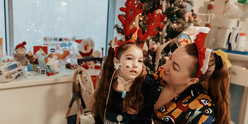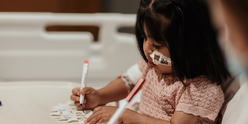How space hoppers help treatment of cystic fibrosis
29 Dec 2016, 12:02 p.m.
Helen Douglas, Cystic Fibrosis Physiotherapist at Great Ormond Street Hospital (GOSH), talks about her amazing work helping young patients and their families to engage in vital exercise.
Can you tell us a little bit about your role?
I’m one of the cystic fibrosis physiotherapists in the team at GOSH. I work on Badger Ward where children are admitted in need of intense treatment for cystic fibrosis. I also work in outreach so I see children at clinics, in schools, at their homes or in their local gyms.
I went to university to study physiotherapy and I always thought I’d end up working with children. The thing that I like most about working with children is that you’re still working as part of a hospital – as part of that big team – but you also get to know the patients and families over time. That’s what I really like doing – building that relationship with them and supporting their treatment.
How young are the patients when they start physio?
Some of the children we treat come to us when they’re just a few weeks old. At GOSH, the family will be invited up for a diagnostic day, when they’ll meet a consultant and a specialist nurse. They’ll then come back for an education day and that’s when they meet the whole team – we’ll all meet the families and explain our different roles.
Mostly, the children are usually about six weeks old when we start to talk about exercise – families often think we’re barking mad, talking to them about exercise for their newborn baby!
Tell us about the relationship between physiotherapy and cystic fibrosis.
It’s a really exciting, dynamic field to work in – there’s so much research and progress going on in cystic fibrosis (CF) at the moment.
Physio is key in the management of CF and its role is constantly developing. Traditionally, it’s very much focussed on airway clearance and clearing the secretions the patients produce in their chest with different techniques. In more recent years, general exercise has taken a much more significant role – there’s very clear evidence of the benefits of aerobic fitness for people with CF.
How does aerobic exercise help CF?
The evidence at the moment says that a combination of aerobic exercise and resistance work is the best approach for CF – a balance of the two. There’s no one type of exercise that has been proven to be more helpful to CF than others, so we use that to our advantage and advise a wide variety of different routines and activities.
The most important thing is that patients exercise regularly and enjoy it. I’m a typical physio – sport has always been a key part of my life, and I truly believe that there are huge benefits for everyone in taking part. Exercise is not just about the physical positives but the improvements in body image and quality of life too. Our role is to encourage people to get involved in all kinds of exercise and exercise they enjoy.
The most important thing families can embrace is an active lifestyle. We recommend that patient’s families do daily 15-minute exercises with their baby. A lot of children with CF will also have a burden of care – tablets to take and so on – so keeping up with a fitness plan can be quite tricky. It’s about introducing exercise as part of their daily routine as opposed to framing it as treatment.
So why space hoppers?
Many young people just aren’t interested in exercise. For example, teenage girls are an important group that can be challenging to engage in sport. It’s about finding something that’s fun – ways they can engage with their friends and siblings. Space hoppers are great – they’re fun and they can compete and just have a laugh. Who doesn’t like space hoppers?!
This way, they don’t have to think about their treatment. Physio can be unpopular with young people, so if we can present it less as a medical treatment but as something social, then we’re winning. We all know that finding the motivation to adhere to an exercise regime can be difficult – so it really does help to be fun!
Find out more about physiotherapy at GOSH – learn more about our care, the conditions we treat and meet the team.





